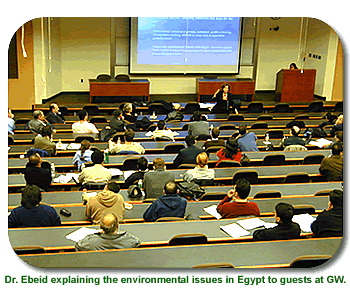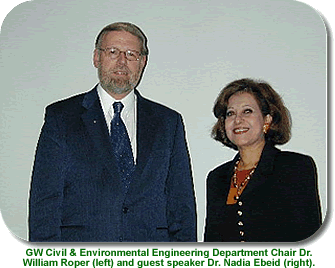On November 26, 2002, Dr. Nadia Ebeid, the first minister appointed to the newly created Ministry of the Environment in Egypt, gave an overview of the environmental issues in her country and shared her experiences in implementing policies. Dr. Ebeid is also the first female Minister of the Environment in the Arab World. She was influential in the incorporation of environmental issues in Egypt's Five-Year Development Plan (2002 - 2007) and worked with Egyptian cabinet ministers, the private sector, and the civil society. She developed Egypt's National Strategic Environmental Policy Framework and National Environmental Action Plan (NEAP), with strong emphasis on public-private partnerships and international cooperation. Dr. Ebeid established and oversaw 14 programs to implement NEAP, including Egypt's first $400 million private sector driven National Integrated Solid Waste Management Program.
In her speech, Dr. Ebeid noted that the major environmental challenges in Egypt were air pollution, water pollution, threatened natural parks, environmental data issues, legislative concerns and lack of environmental awareness. According to Dr Ebeid, the National Environmental Action Plan (NEAP) is an important step in the path to sustainable development. It was prepared through the formulation of five working groups on water, air, land, waste and global environmental issues, and includes the following 14 programs:
1- Protection of the Nile River and Water Resources
2- National Program for Integrated Solid Waste Management Systems
3- Environment-Friendly New Industrial Cities
4- Integrated Program for the Improvement of Air Qulaity (Greater Cairo)
5- Egyptian Environmental Policy Program
6- Environmental Education, Training and Awareness
7- Environment-Friendly Technology Transfer
8- Environmental Information Systems
9- Environmental Management
10- National Program for the Protection of Biodiversity and Management of Natural Areas
11- Capacity Building for the Egyptian Environmental Affairs Agency and its Regional Branch Offices
12- Environmental Finanacial Mechanisms
13- Green Area Expansion
14- International and Regional Commitments

Dr. Ebeid concluded that these programs led to positive results, such as pollution abatement in the Nile River, introduction of environment-friendly technologies, complianve of 4 new industrial cities with environmental laws, collaboration with the international community, and the growth of the Ministry. Dr. Ebeid pointed out at the end of her speech that for success, there is a need for:
-- commitment to the environment,
-- coordination between different entities,
-- decentralization, and
-- follow-up activities through field trips and communication with people.


